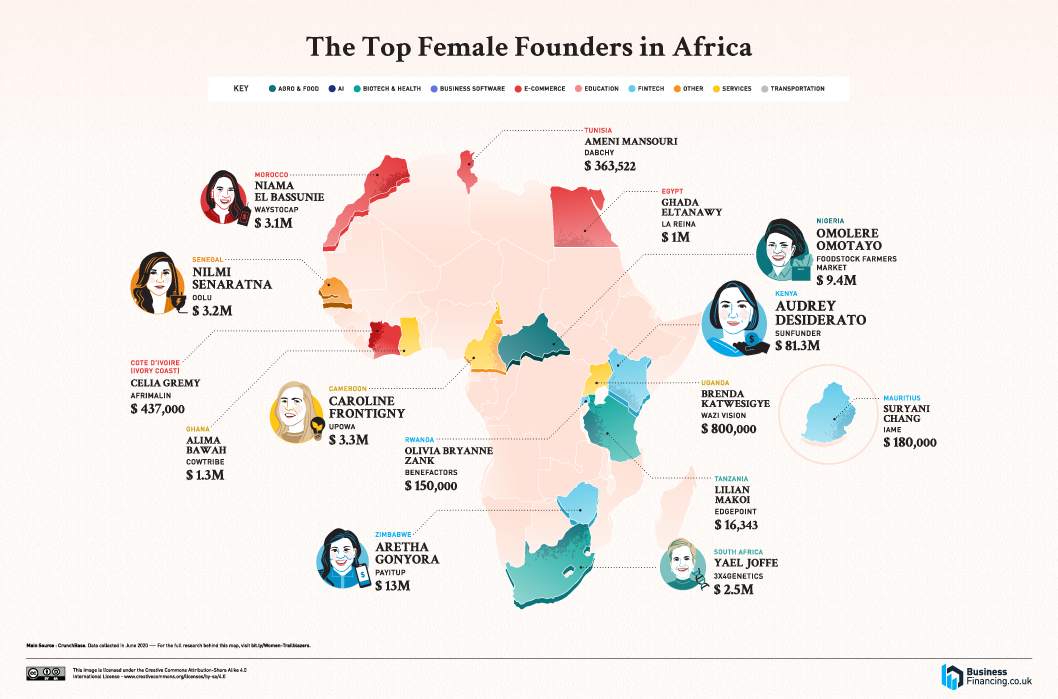Entrepreneurs
Women Trailblazers: The Most Successful Female Founder in Every Country

If you are a female entrepreneur, it’s natural to feel like the odds are against you. After all, there continues to be a significant bias towards a male-leadership model, and investors still tend to be more cautious in their response to pitches from women.
You shouldn’t be put off by nay-sayers, though. If you’ve got a great business idea, it’s really worth persevering to make it happen. Despite the fact that only 15% of venture capital is invested in them, women-led businesses consistently offer a better return on that investment.
Women entrepreneurs out-perform their male counterparts in terms of revenue, in part because their motivations tend to be less profit-driven. With a more meaningful, customer led approach, greater interest in corporate social responsibility, and collaborative working culture, they are primed for greater overall success.
To celebrate the impressive achievements of women who are world leaders in startup business, BusinessFinancing have gathered data on the top female founders from country to country around the world.
Top 5 Women Startup Founders Around the World
The data shows that startup success is possible across a wide range of industries, with particular success in fintech and e-commerce. The self-made women with the highest levels of finance are spread across the continents. Lucy Peng’s online finance company Ant, which is based in China, has achieved a massive $22 billion in funding. No wonder she was named Forbes’ 35th most-powerful woman in 2016.
Hot on Peng’s heels is Rebekah Neumann, whose US-based real-estate company The We Company, which specialises in establishing collaborative work spaces, achieved a significant $19.5 billion. With the third highest funding of $9.9 billion, Singapore’s Tan Hooi Ling has revolutionised transportation with her Grab app, which connects drivers and passengers.
Innovating fintech to offer more personal finance services to smaller businesses, and creating a fairer personal lending platform, Kate Keenan (Judo Bank – Australia) and Victoria van Lennep (Lendable – UK) achieved similar funding levels of $1.4 and $1.2 billion, respectively.

Top Women Founders in Europe
In addition to Victoria van Lennep’s huge success in fintech with Lendable, the biotech and health industry is a thriving field for startups in Europe. Switzerland’s Ilise Lombardo has raised a $278 million fortune for the biopharmaceutical company Arvelle Therapeutics, specialising in treatments for disorders of the Central Nervous System (CNS). In Sweden also, Josefin Langerd got $348 million for KRY’s healthcare and digital health services.
Lifestyle systems and wellness are flourishing fields for women entrepreneurs in eastern europe. Anja Varnicic raised an impressive $127,054 for her mini indoor garden enterprise in Serbia, and Belarussians Luba Pahkovskaya and Natalia Bahar each raised $265,000 each for their wellness and fitness app, Verv.

Top Women Founders in North America
Women are making it big with e-commerce and business software in North AMerica. After Rebekah Neuman, Canada’s Michelle Romanov has raised $119.2 million for Clearbanc. The data also shows that community-focused startups are financially viable, with $100,000 raised by Marwa Alhaj in Panama for her security and communications software company, and $130,00 by Morgan Babbs, who is making a difference to low income houses with her solar solutions company, Colibri, in Nicaragua.

Top Women Founders in South America
Brazil’s Cristina Junqueira is pretty inspirational. Not only did she raise $1.1 billion for her finance company, Nubank, but she is also a vocal advocate for gender equality and inclusion in the world of business and finance. She clearly understands the benefit of being forward-thinking and how embracing diversity will attract new talent. No wonder she was listed twice as one of Forbes’ most powerful women!

Top Women Founders in the Middle East & Central Asia
There’s a lot going on for women entrepreneurs in this part of the world, with start up founders doing well in the fields of education (Lamia Tabbaa and Rami Kayyali at Little Thinking Minds in Jordan) and gaming (Rina Onur Sirinoglu at Peak Games in Turkey), as well as the usual finance and e-commerce.
Making a significant difference to the field of biotech and health, Miri Ratner has raised $188M as co-founder of Yayar. Yayar developed a sensor that was initially intended as an early detection system for breast cancer, but has since found applications in robotics, intelligent vehicles, and security systems.

Top Women Founders in the Rest of Asia & Oceania
Of the top ten financial successes in this region, half were in the fields of fintech and e-commerce. As well as frontrunners Lucy Peng (China) and Kate Keenen (Australia), Japan’s Miku Hirano has made great waves with her AI company, Cinnamon. Hirano was inspired to create innovative solutions to improve working culture after the birth of her child. She envisioned how AI assistance in cumbersome tasks could facilitate a healthier future for future generations.

Top Women Founders in Africa
Of the 15 African countries included in the study, women have made strides across a wide range of industries. As well as the usual fintech and e-commerce, various services are focused on helping people in the community access health care, energy, and resources.
Audrey Desiderato has achieved great success, raising $81.3 million for her solar-energy Kenyan company, SunFunder, while Alima Bawah’s Cowtribe made $1.7 million to provide farmers with animal vaccines in Ghana, and Brenda Katwesigye raised $800,000 for WaziVision to provide recycled glasses to people in Uganda.

From finance to farming, there’s more to building a successful startup than money. Women entrepreneurs have a talent for seeing how business affects people, and that makes a big difference.
Entrepreneurs
Why Most Successful Entrepreneurs Feel Like Imposters and How to Fix It
Signs and symptoms of imposter syndrome

Among all the open discourse on mental illness and how it affects different people in their lives, you may have occasionally heard the phrase “Imposter Syndrome” from time to time. (more…)
Entrepreneurs
Smart Business Owners Are Using These Natural Hacks to Outperform the Competition
The smartest companies have figured out that naturopathy in the workplace isn’t just feel-good fluff

Ever sat at your desk thinking, “I seriously can’t handle another day of this”? Does your neck ache because your chair feels more like a torture device than office furniture? Or maybe you’ve been waking up at night panicking about that dreaded meeting again. (more…)
Entrepreneurs
This Scientific Tool Is Reshaping the Way We Make Business Decisions
Organisations that integrate technology intelligently see transformation not just in output, but in thinking

The rules have changed. Technology no longer plays a supporting role, it now drives progress across every industry. From laboratories to boardrooms, innovation has become essential. (more…)
Entrepreneurs
How Workplace Toxins Are Quietly Hurting Employee Performance
Many modern organizations dabble in hazardous substances that can directly impact employee health

Some of us may view sustainability as a buzzword. In the US, environmental risks have become a more legitimate concern than ever. Business leaders cannot afford to sideline them. It doesn’t matter whether your firm is a well-regarded organization or a fledgling startup. (more…)
-

 Success Advice4 weeks ago
Success Advice4 weeks agoStephen Covey’s 8 Leadership Habits That Will Change How You Lead Forever
-

 Personal Development4 weeks ago
Personal Development4 weeks agoWant to Change the World? Start by Sharing Your Knowledge
-

 Business4 weeks ago
Business4 weeks ago7 Legal Situations Every Small Business Owner Should Prepare For
-

 Success Advice3 weeks ago
Success Advice3 weeks agoThe One Mindset Shift That Made Me Irreplaceable At Work
-

 Scale Your Business3 weeks ago
Scale Your Business3 weeks agoWhy Smart Entrepreneurs Never Skip This One Business Expense
-

 Success Advice2 weeks ago
Success Advice2 weeks agoHow Playing by the Rules Became the Smartest Business Strategy
-

 Did You Know2 weeks ago
Did You Know2 weeks ago7 Surprising Life Lessons Video Games Taught Me That School Never Did
-

 Success Advice1 week ago
Success Advice1 week agoHow to Build Trust, Kill Micromanagement, and Lead a Team That Thrives





























